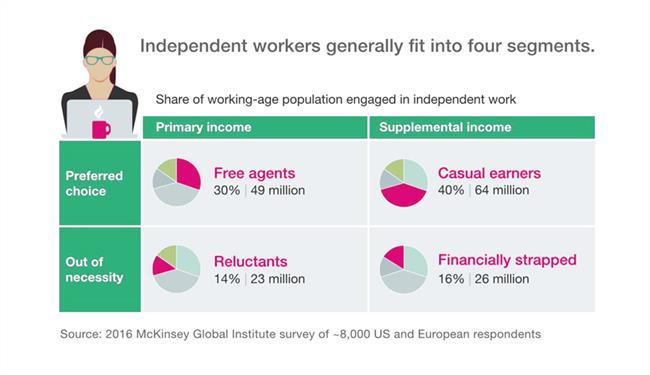Between 20 and 30% of working people have created their own jobs in Europe and the United States, notes a study. The digital economy has a lot to do with this phenomenon. What is the extent of this trend and do your HR departments need to adapt?

A 9-to-5 job with one employer is no longer an accurate picture of the way a good part of the population works in 2016. Millions of people combine earnings from several jobs. The phenomenon is admittedly not new, but statistics illustrating its scale had been lacking until recently.
The McKinsey Global Institute measured the phenomenon and sounded out the motivations of Americans and Europeans working in what has been dubbed the "gig economy", popularised by online services like Uber, AirBNB and TaskRabbit.
4 new categories of workers
8,000 people were surveyed about their activities and income over the last 12 months. The Institute identified four large segments on this market:
A new and interesting fact: only 15% of those surveyed use digital platforms like Uber or Fiverr to find work.
Two possible and perhaps complementary conclusions:
- Most independent workers continue to find clients without using third-party services
- 15% might suggest that the phenomenon is just getting off the ground and that the proportion is likely to show a sustained rise in the coming years
An inevitability in this time of uncertainty? Not really. 70% of independent workers do so by choice rather than necessity.
HR scouting for freelancers?
While it is still too early for the practice to become widespread in companies, it is little by little becoming more accepted, but not just for economic or contractual reasons. Consumer demand for independent services and service providers is also on the rise. Services like ListMinut in Belgium bear this out: the site currently lists more than 19,000 service providers across Belgium.
The American government is aware of the trend and has ordered its Bureau of Labor to look into it.
A report published in May 2016 describes at length the extent of the "gig workforce" in the American economy. The same department plans to launch a new data gathering process in May 2017. There is also a brand new set of data in the United States, "non-employer" statistics, which can be accessed freely online. The economic weight across sectors is huge: US $1.1 billion in 2014.
09.10.2018
How to prevent a stroke with the help of your smartphone
Fibricheck is a medical application that anticipates strokes using just a smartphone. This kind of innovation focused on human well-being is at the heart of BNP Paribas Fortis’s sustainability strategy.
Digitalisation is affecting even medicine. Convinced that the digital world and the traditional medical world must work together, Fibricheck has developed an application to anticipate strokes. This ethos makes human interests a core concern.
By supporting this Belgian company, BNP Paribas Fortis wants to do its bit to build a more sustainable world and help new and inspiring ideas to emerge.
A diagnosis using your smartphone
Smartphones are becoming increasingly important in our everyday lives. We use them to communicate, cook and read... so why not for medical diagnosis? With Fibricheck, the user can now check their heartbeat, to anticipate the risks of a stroke. The Fibricheck application focuses on the most common kind of heart arrhythmia: atrial fibrillation, which is responsible for 20% of strokes.
How does it work?
Above all, it is important to know that Fibricheck is available only by medical prescription. Once you have installed it, you just need to put your finger on your smartphone camera for 60 seconds, for all the required data to be recorded. The algorithms will do the rest, to provide an instant result. If any anomalies are detected, the results will be analysed by a Fibricheck doctor and made available to your doctor. Technology is used to serve human interests.
An irregular heartbeat is not always easy to detect. The advantage of Fibricheck is that it does not need to be used in a specific place (e.g. at the doctor's surgery), or during a set period. It allows multiple measurements to be taken, to provide an overview of your heartbeat.
Checks in companies
The health of your employees is crucial. Heart arrhythmias do not always have clear, visible symptoms. Consequently, detection plays a crucial role in preventing the greatest risks. This is why Fibricheck is offering to check your employees.
For more information, consult the Fibricheck website.
03.10.2018
Challenges when recruiting internationally
Recruiting a member of staff for relocation to a foreign subsidiary requires some careful thinking. We have compiled the questions that are most frequently asked when people are faced with this human-resources quandary.

International recruitment involves recruiting people in their company's country of origin and relocating them abroad to work in a foreign subsidiary. In a globalised world, this has become common practice. However, when setting up a Belgian company abroad you will face a series of legal obstacles, as soon as your employees cross the border out of Belgium. These include employment laws, residence permits, taxation and social security. These questions will make things clearer up for you:
Should I recruit before developing my strategy?
No. Before starting the recruitment process, the first thing that a company must do is clearly define what it wants to achieve in the country where the subsidiary will be set up. It must take cultural differences between the countries into account. If the company usually recruits locally to be on the same wavelength as its target customer, when recruiting internally candidates should be adaptable and self-reliant, but above all they should be fluent in the country's language (in English, at the very least).
Can my employee work in this country?
If the free movement of workers applies within the EEA (European Economic Area) and in Switzerland, you do not need any special permit apart from your Belgian identity card. You must have a work permit as soon as you cross the border out of this area. The paperwork to apply for this can be extensive and even complicated (particularly in the United States). It is essential you have a lawyer who specialises in immigration.
Do I need a centre of operations in the country?
If you want to employ staff in a different country, you should have a local entity. Depending on the country in question, a small entity (sometimes no more than a letterbox) can be enough.
Where should social-security contributions be paid?
In the EEA and countries that have a bilateral social security treaty with Belgium, the social security system in the country of work will apply. In situations involving simultaneous employment, the social security system in the country of residence applies. As a rule, an employee cannot be subjected to different systems. Outside the EEA, you should operate on a case-by-case basis (legal and tax advice is essential in these situations).
What about salary and working conditions?
Employees can only work in an export market if they have an employment contract adapted to the salary and working conditions of the country in question. As a general rule: the mandatory legal provisions in the country of work will take precedence over the ones that appear in your Belgian employment contract.
Where should taxes be paid?
Double taxation is not a very appealing option for employees who are being relocated to work abroad. To avoid this, Belgium has signed treaties with a large number of countries specifying the country responsible for taxing the salaries that you pay. As a general rule, workers are taxed in their country of work, except in cumulative cases (the 183-day rule), where the national law of the country responsible for taxing the salary will apply.
Can I recruit internationally from Belgium?
Yes, you can. For example, in the Brussels-Capital Region, Actiris has an International department, which selects candidates with an interest in working abroad. This body is a member of EURES, a network of more than 1,000 employment counsellors (EEA and Switzerland). If your employees do not want to be relocated abroad, its counsellors can also place your job offers on the EURES portal.
Should I go it alone?
Certainly not. The steps that you need to take before relocating one of your workers abroad or recruiting internationally are too complex for you to tackle without any advice; only a specialist firm will be able to help you take these different steps (residence permits, work permits, social-security payments, taxation).
15.06.2018
Could your intuition help you make better decisions?
All of us have heard that little voice in our ear quietly persuading us of a new idea or a different way to tackle a challenge at work. But acting on that voice is another thing altogether. And yet...
Marcel Schwantes, an expert in workplace culture based on "servant leadership*", is well placed to recognise his intuition speaking. This small voice inside us has a tendency to bring out, from the deepest recesses of our beings, feelings that can be buried under rational layers of logical thinking.
People who are emotionally intelligent are more readily able to listen to this internal compass in order to keep themselves on the right track. But not everybody has this capacity.
How can we recognise the voice of our own intuition?
Here is some practical advice:
- If the voice signals a danger, it is undoubtedly your intuition speaking.
- Intuition speaks to you in a way you cannot ignore.
- First of all, we tell ourselves the voice is wrong.
- It gives us a message that is not particularly comfortable.
- We do not really want to act on its advice, or we tend to put off doing so.
- It seems counterintuitive!
- We allow ourselves to put it out of our minds...
Intuition and integrity – a perfect partnership
The reason why many of us still disregard this voice is that it can sometimes be unsettling. It pricks our consciousness and challenges our convictions, habits and belief systems. Yet it can hide precious inner resources just waiting to be revealed.
But to be able to utilise them, we must demonstrate integrity. When activated by the necessary bravery, this partnership between integrity and intuition can become a superpower that allows us to handle tricky workplace situations – or even run a company!
Source: Inc.com
*Editor's note: Liberated leadership, as opposed to authoritarian leadership.
05.06.2018
Reforestation and biodiversity in practice
Some causes are more important than the pursuit of EBITDA. Without trees there can be no biodiversity, and flora, fauna, soil, water and air are all affected. That is why WeForest is mobilising companies to plant forests.

Reforestation is neither a luxury nor a question for hippies. It is indispensable for the climate and biodiversity, the quality of our soil and water, as well as for food; it is thus vital for the future of all species.
The solutions, which remain under-recognised, are simply waiting to emerge. They are not technical, do not adhere to the logic of extraction and do not call on limited natural resources. They are tremendously effective, draw their inspiration from natural ecosystems and entail integrating trees into fields.
We have pinpointed two relevant non-governmental initiatives: Ecosia, a search engine launched by a start-up in Berlin, has attracted 7 billion users and plants one tree for every 45 searches made – the equivalent of some 27 million trees planted to this day; secondly, the non-profit organisation WeForest is utilising its expertise in this area, its basis in science and its business network to engage in sustainable reforestation. We went to meet Marie-Noëlle Keijzer, the founder of WeForest, to hear her story.
From carbon offsetting to corporate 'water footprints'
In the early days, WeForest was not convinced by carbon offsetting, which it regarded as too reductive. Yet it was a means to connect with its target audience: companies anxious to measure, reduce and then offset the carbon emissions that they are not able to avoid. Today, the objective of 'net positive emissions' has been set, which also aims to offset past emissions.
It is obvious that environmental concerns now extend beyond carbon alone. Many are beginning to examine their water footprint. A new vision is taking hold, which entails development aid via the promotion of reforestation. "Moving countries out of poverty and doing more than simply planting trees and leaving: this is how companies now wish to act in a socially responsible way", explains Marie-Noëlle Keijzer, CEO of WeForest.
Intervening on vegetation, carbon, water, air and employment
With the 270 corporate clients that have joined it since 2011, WeForest planted almost 17 million new trees and restored 13,000 hectares of land by the end of 2017, and aims to double these figures by 2020. It offers high-impact marketing materials to customer companies with messages such as 'one sale = one tree planted'.
In 2014, Brabantia decided to 'do something different'. It wanted to sell products, of course, but also give thought to global issues. Working alongside WeForest, the company entered into a joint financing project supporting reforestation. "Since Brabantia began to state on its website, on YouTube and on its packaging that one tree would be planted for every rotary dryer sold, it has seen a 25% increase in sales every year", explains the head of WeForest, citing well-substantiated case studies with certified benchmarks: "We go beyond the theoretical", she continues. "There is total transparency, with every customer receiving a GPS map of the hectares they have funded. We then ensure the forest is protected, approve our customers' projects and help develop the socio-economic activity of the entire region by initiating alternative revenue sources which create employment."
A tree is more valuable in the ground than on it
WeForest is not engaged in helping Zambia in order to maintain its reliance on international aid, but to educate the hundreds of farmers who chopped down all of their trees in order to sell them for firewood. By bringing them together, the association demonstrates that they do not have to clear trees to sell forestry chips, and that by selectively collecting biomass, they can provide heat without cutting a tree down. WeForest trains women to work as nursery growers, giving them a job, an income and an identity. It also supplies beehives to farmers who have begun to produce honey as a new source of income. Bees have other positive effects too, since they pollinate flowers, plants and fruit crops, for example. "It's really simple", affirms Marie-Noëlle Keijzer. "If we kill bees and birds by using pesticides and insecticides, we are preventing nature from doing its work."
Trees provide a habitat for animals and natural fertiliser for plants
In regions of Brazil where tree coverage is 3%, leopards have completely died out. Agriculture has supplanted forests wherever the ground is level. WeForest cannot operate across the entirety of the country, which is much too large. But they have created green corridors, and life has begun again. Trees and plants have been restored, attracting birds and animals that use them to move around, eat and reproduce.
Trees are also a natural source of fertiliser: corn grows more quickly when it is close to trees. They provide shade and retain water in the soil.
There are trees and trees
Not all reforestation projects are equal. Some trees boost the food supply or increase soil nitrogen levels (such as the lucerne), whereas others are detrimental to diversity. For example, no animals will live in palm tree plantations where the soil is also full of chemicals. "We won't solve the problem if we do nothing to change the causes of deforestation: intensive agriculture for the purposes of producing meat, for example", says Marie-Noëlle Keijzer, firmly convinced. Solutions exist, but everyone needs to accept their share of responsibility.

